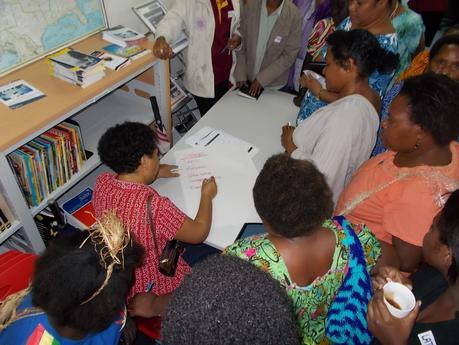
Women from the Papua New Guinea Women’s Chamber of Commerce and Industry participating in a capacity building workshop
Since its creation in 1983, CIPE has been working with business associations, chambers of commerce and economic think tanks around the world to promote institutional reforms and advance economic and political empowerment.
Women business associations are one type of business associations that CIPE has partnered with in order to support the economic empowerment of women. Recognizing the unique role such organizations play, CIPE has focused on strengthening women business associations and thus empowering women to become entrepreneurs and leaders in their local communities and countries.
For instance, CIPE recently cooperated with the International Labour Organization with the view to provide technical assistance for women economic empowerment to a group of Somali business support organizations. An exciting component of this initiative in which I have been involved is assisting with the establishment of a women’s chamber of commerce in Somaliland. This assistance has come also in the form of sharing examples, experiences and best practices from women organizations and especially women’s chambers of commerce around the world.
Some of these examples and experiences are presented in this month’s Economic Reform Feature Service article, in which I examine the creation and operation of women’s chambers of commerce around the world, as well as their programming.
While there are many differences among countries in terms of legal framework, economic and social conditions and cultural norms, typically women chambers of commerce provide their members and potential members with a wide range of programs and services that include: nformation and training on how to formalize a business, thus helping women entrepreneurs enjoy the protection granted by the law and access to funding;
- Training and education opportunities, in the form of workshops, conferences, mentorships, and internships
- Recognition and awareness – building programs
- Linkages with new customers and markets through fairs, trade missions and investment forums
- Representation of their business interests by identifying business constraints, promoting policy proposals and eliminating obstacles to women’s economic participation.
To learn more about the characteristics of women’s chambers of commerce, and how they were created and operate, read the latest Economic Reform Feature Service article.
Carmen Stanila is a Senior Consultant at CIPE.

